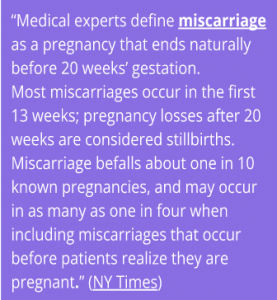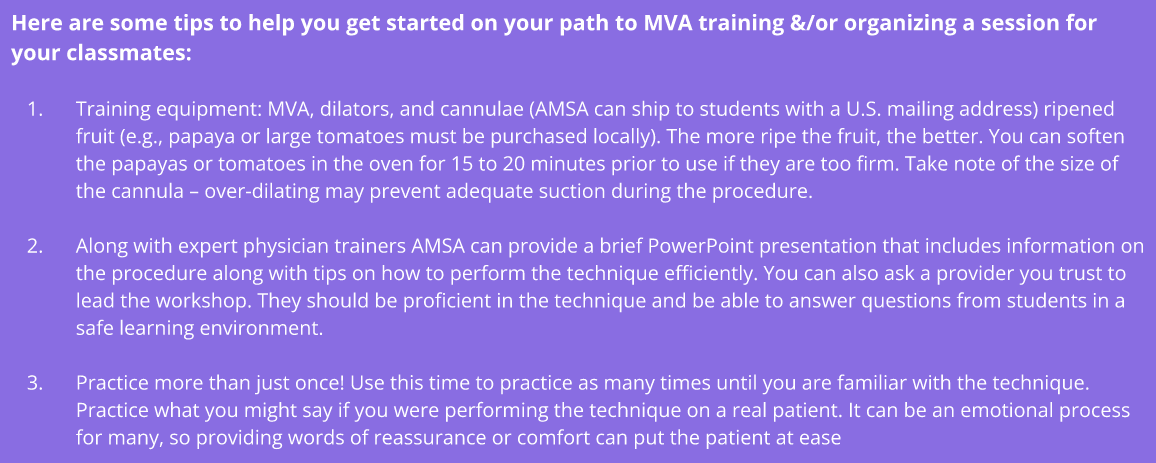Written by Dania Abid, AMSA Vice President for Programming Development. Dania is a 3rd year medical student at the Idaho College of Osteopathic Medicine.
She is completing her clinical rotations at Stony Brook, Long Island and is passionate about female reproductive health and advocacy.
Abortion Training – Essential Component of Medical Education,
Ensuring Options Post-Roe
As medical students, during our OB rotations, we learn about pregnancy and conditions that can cause complications that could lead to miscarriage and stillbirth. The medical term we learn for miscarriage is “spontaneous abortion.”
Evacuating the uterus is essential when people experience a miscarriage, “treatment options include expectant management, medication, or surgical interventions.” 
“…evacuating the uterus, is a core procedure for OB-GYN…
So it’s a technique that has to be learned.”
The medical skills needed to treat a miscarriage are the same medical skills needed to provide care for the 800,000+ people who need abortion care each year in the U.S.
However, that availability, education, and training is now under attack. Following the overturning of Roe v. Wade in June of 2022, many states have been quick to adopt strict abortion policies. We have already started seeing medical student applications to residency processes “thrown into chaos by rapidly changing state and national policies.” Predictions that “could leave nearly one half of U.S. obstetrics and gynecology residents without access to this fundamental facet of reproductive care, thus affecting care for future patients” are starting to come true — 100 days Post-Roe at least 66 clinics across 15 states have stopped providing abortion care” thus limiting training opportunities for providers and care availability for patients.
Up to 25 percent of females will have an abortion by the end of their reproductive years. The process of getting an abortion, whether medical or elective, is deeply personal. It is also an essential skill for current and future healthcare providers to be proficient in. In an interview with Vice News AMSA Graduate Trustee Dr. Avanthi Jayaweera talks about “What Happens When Doctors Don’t Learn How to Do Abortions” and discusses without appropriate training:
“In those 2 a.m. moments in the middle of the night,
will you know what you need to do to save someone’s life?”
Election outcomes of the abortion related state ballot measures in California, Kentucky, Michigan, Montana and Vermont give us hope – voters in all 5 states voted to protect abortion care.
As our federal and state elected leaders sort through the disaster created by the Supreme Court decision AMSA is taking action! Through the AMSA Abortion Care & Reproductive Health Project we are proud to offer a wonderful opportunity for medical students to learn and practice manual vacuum aspirations (MVA) skills. Throughout the year we will be offering virtual and in-person training opportunities to AMSA members and Chapters free of charge!
If you are interested in MVA training for yourself, or your AMSA chapter, or in organizing an MVA training for classmates at your campus, please complete the short form at this link. AMSA is able to provide background information, physician trainers, and training equipment for educational purposes at no charge.
If holding a skill-building MVA workshop is not an option at your school, you can also engage in a meaningful discussion on various women’s health topics by arranging a Film & Discussion session for your classmates. For example, “At Your Cervix” provides insight on performing pelvic exams. These sessions offer a unique opportunity to have an open conversation as future medical providers. For more information you can also email bmartin@amsa.org.
Explore the AMSA Reproductive Health Project
Find news, tips, tools, opportunities & more!
Sign-up Here for AMSA Repro Project Action Updates

